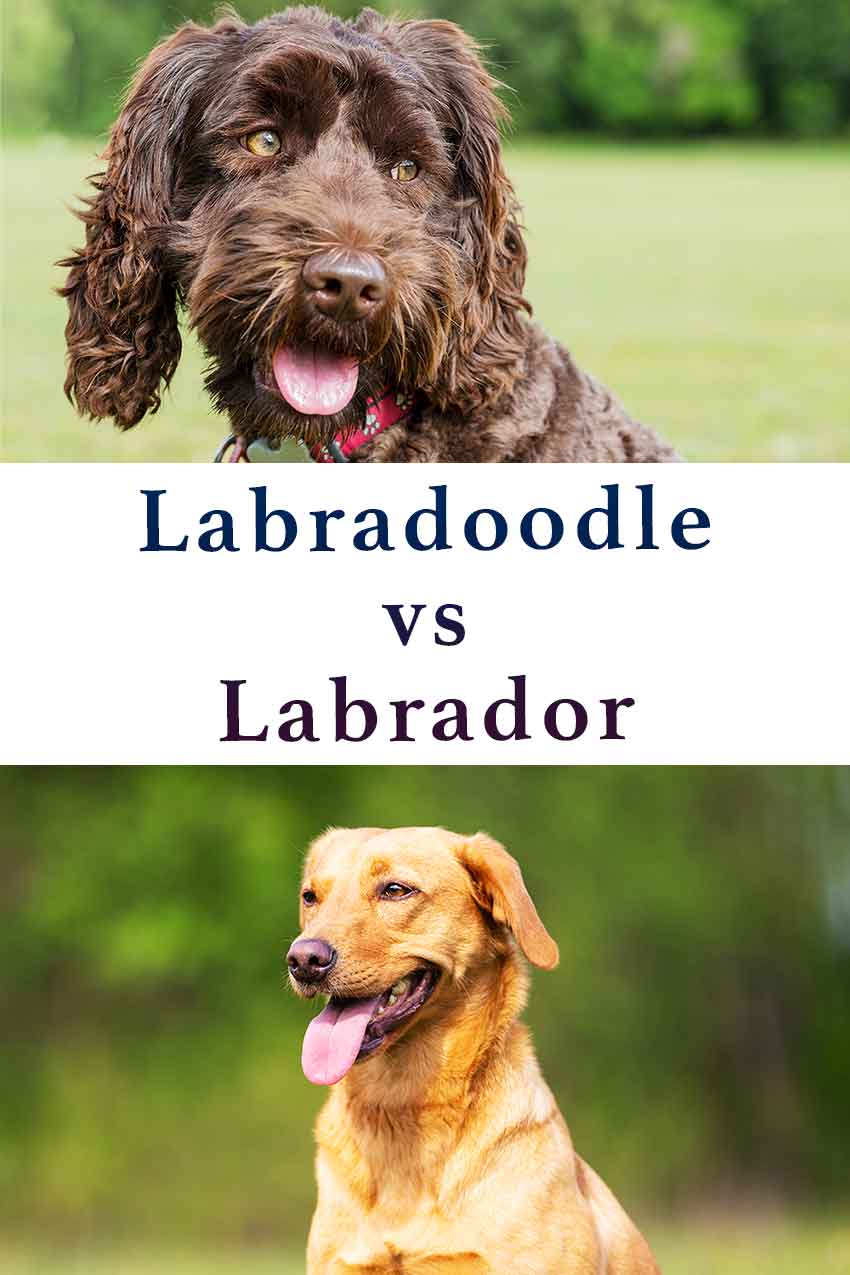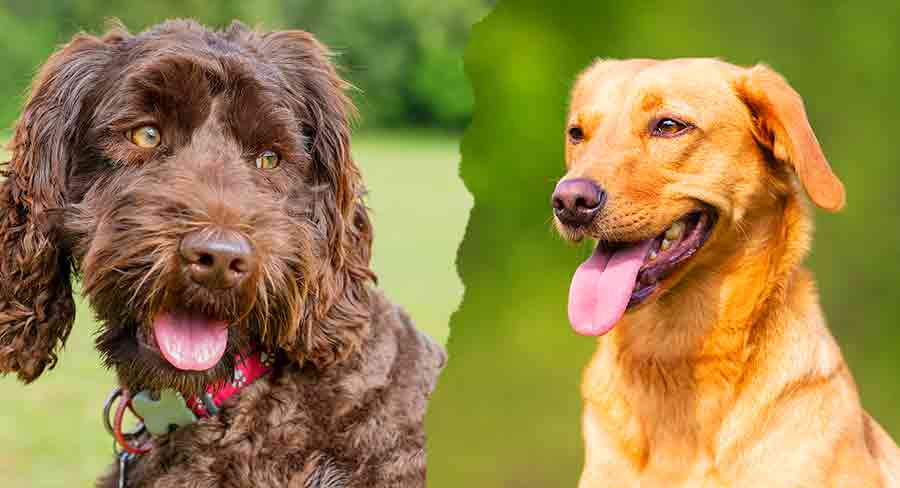Are you having trouble choosing between a Labradoodle and Labrador puppy? Today we are going to look at what you can expect to find when you stack up a Labradoodle vs Labrador, and help you to decide which dog is a better fit for you!
In general terms Labradoodles tend to be a little more laid back than Labradors, and have longer, curlier coats. The Lab can be bigger, more forward and friendlier to strangers. The Labradoodle is usually a little lighter, and more focussed on their family.
Contents
- What is the difference between a Labradoodle and Labrador?
- Labradoodle vs Lab size
- Labrador vs Labradoodle coat care
- Temperament and personalities
- Energy levels and activity
- Training and intelligence
- Labradoodles vs Labradors as family pets
What is the difference between a Labradoodle and a Labrador Retriever?
Some Labs and Labradoodles can be quite similar to one another, whereas others can be varied in terms of looks and personality. That’s because a Labradoodle is 50% Labrador Retriever, but you don’t know which half is going to show itself until your puppy arrives.
Although generally similar dogs, due to being closely related, there are some differences between the Labrador and Labradoodle. Things that could sway you more towards owning one than the other.
Labradoodle vs Labrador Size
Labradors are usually bigger than Labradoodles. There are two quite different lines of Labrador, the English and the American version. English Labs bred for the show world are heavier and stockier. American Labs bred for working tend to be a little lighter. But they are both still heavier than the average Labradoodle. The average Labrador weighs anywhere between 55-80lbs, but Labradoodles can vary even more than this.
If your Labradoodle is a Labrador Standard Poodle mix then they are likely to be on the lighter side of this, but could fall anywhere between 40 to 80lbs. However, if they are a mix with a smaller Miniature or Toy Poodle their size could be considerably smaller. Potentially weighing as little as a tiny 10lbs!
Labradoodle vs Labrador Coat Care
You might think that a Labradoodle will be higher maintenance than a Labrador when it comes to coat care. And this assumption makes sense on the surface because they are curly and need clipping. However, Labradors shed like crazy and as a result need very regular grooming.
The main difference is that you will never need to clip a Labrador, and so won’t need to either learn to do this yourself or to take your dog to the groomers every six weeks.
Labradoodle vs Labrador Temperament
Labradors tend to be a little more excitable than Labradoodles. They might be more forward with strangers and other dogs. The Labradoodle tends to be a little calmer, more standoffish with strangers and focussed on their owner.
The temperament of Lab or Labradoodle you get will again differ depending on whether there is American or English lines in the Lab part of the family. Working American Labs tend to have a higher prey drive, be more active but a little less playful than the English Lab or Labradoodle.
The range of personality with the Labradoodle varies more from dog to dog than it does in the Labrador Retriever. That’s because a Labradoodle puppy could take more after their Poodle parent or their Lab parent. And you won’t know which one they’ll be the most like before they are born.
Labradoodle vs Labrador Energy Levels
Both the Labradoodle and Labrador are high energy dogs. They are active, enthusiastic and will be delighted to accompany you on hikes or runs on a regular basis. They need fairly equal amounts of exercise each day, and that all-important training.
Labradoodle vs Labrador Training and Intelligence
These breeds are very evenly matched when it comes to intelligence. Labradors and Labradoodles are both exceptionally smart dogs. They take eagerly to training, and benefit hugely from positive modern methodology. Especially because they are motivated by food.
These dogs come from long lines of working animals, bred for centuries to work cooperatively with their handlers, obey complex commands and fetch game. Even though the Labradoodle is a mixed breed, their history as clever dogs on both sides of their family makes for a busy brain.

Health Issues
Labradors have some health issues that any potential puppy parent needs to know about. These include hip and elbow dysplasia, as well as eye problems. The parent dogs need to have low hip scores, low elbow scores, a clear recent eye test and a clear PRA test before a mating is considered. And the same goes for your Labradoodle’s Lab parent.
The Labradoodle also needs to have a Poodle parent tested for conditions relevant to their breed. Including hip dysplasia, eye issues and some other blood disorders. Provided that you buy your puppy from health tested parents, you have a good chance of raising a fit and well dog from either the Lab or Labradoodle family.
Which makes the better family dog?
Both Labradors and Labradoodles make lovely family pets, when they are raised and trained well. But they aren’t small dogs, and will need to be taught to be gentle and keep all four paws on the floor when interacting with smaller humans.
They both have gentle natures and are not known to show aggression, and will be at ease around strangers as long as they are well socialized from a young age.
Overall we’d give the edge very slightly to the Labradoodle when it comes to fitting in with kids. Because they are a little less bouncy and weigh a little less, so they aren’t as likely to send them flying!
Labrador vs Labradoodle
Labradors and Labradoodles are very similar dogs. After all, they are 50% the same breed! But there are some differences.
Coat care varies between them. If you aren’t a fan of coat clipping or visits to the groomers then a Labradoodle isn’t for you. Likewise if you don’t like brushing and worry about shed fur then a Lab isn’t going to be top of your list.
They are both usually medium dogs, though the Lab is likely to be a little larger than a Standard Labradoodle and a lot bigger than a Mini or Toy mix.
However, if you want a smart, loyal and loving companion, you really can’t go that far wrong with either a Lab or Labradoodle puppy!

